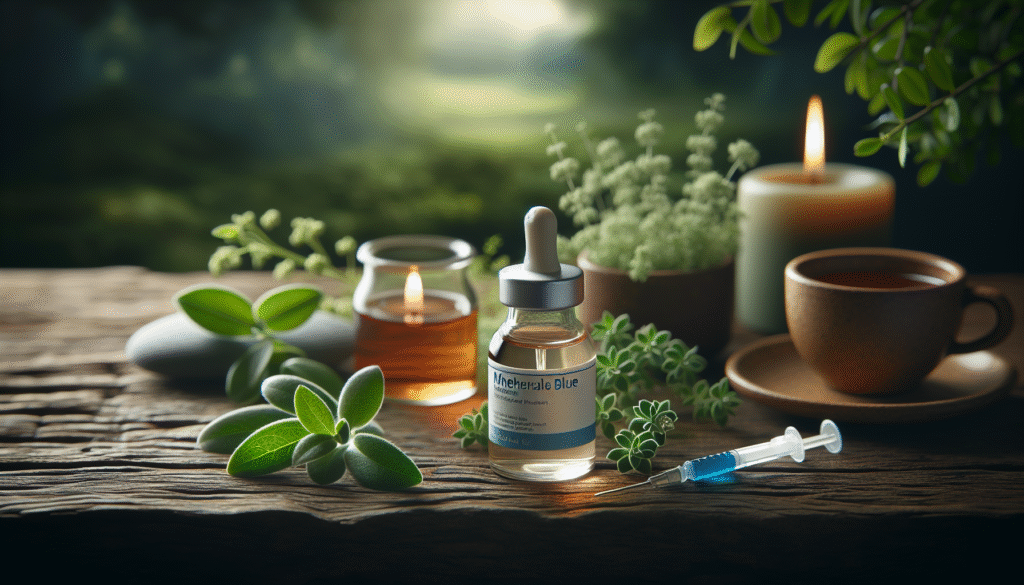
Have you considered the impact of age on your overall well-being? As you navigate the stages of life, it is essential to consider not just how to prolong life but also how to enhance the quality of that life. One substance gaining attention in the realm of health and wellness is Methylene Blue. This compound, originally used in medicine, is now being closely examined for its potential benefits in promoting your well-being as you age.

Understanding Methylene Blue
Methylene Blue is a synthetic dye that has been utilized in various medical applications since the late 19th century. Originally used to treat conditions such as malaria and methemoglobinemia, it is now recognized for its broader implications in health.
The Historical Context
Initially discovered in 1876, Methylene Blue played a substantial role in microbiology. Its vibrant blue color made it excellent for staining cells, thus enhancing the visibility of microorganisms during microscopic examination. However, its therapeutic potential was noted not long after, paving the way for its use in treating certain medical conditions.
Chemical Properties and Mechanisms
Methylene Blue is a phenothiazine derivative and exhibits unique properties that contribute to its effectiveness. It acts as a redox agent, which means that it can accept or donate electrons in a chemical reaction. This ability allows it to participate in various biochemical processes within cells, notably in mitochondrial function, which is crucial for energy production.
The Role of Mitochondria in Aging
One of the primary reasons Methylene Blue has garnered interest in anti-aging discussions is its effect on mitochondria. As you age, mitochondrial function tends to decline, leading to decreased energy production and increased oxidative stress. Here, Methylene Blue may provide a solution.
Mitochondrial Dysfunction and Aging
Mitochondrial dysfunction is often referenced as a hallmark of aging. As cellular powerhouses, mitochondria are responsible for producing adenosine triphosphate (ATP), the energy currency of the cell. When mitochondrial function deteriorates, the body may experience fatigue and various age-related diseases.
How Methylene Blue Supports Mitochondria
Methylene Blue counteracts these aging effects by enhancing mitochondrial respiration and stabilizing the electron transport chain. By improving ATP production and reducing oxidative damage, this compound may help maintain cellular functions and overall vitality as you age.
Cognitive Benefits of Methylene Blue
Cognitive decline is a prevalent concern as you age. Methylene Blue has shown promise not only as a neuroprotective agent but also as a cognitive enhancer.
Neuroprotection and Brain Health
Research indicates that Methylene Blue may protect brain cells from damage. It appears to mitigate the harmful effects of neurotoxins and improve metabolism in neurons, promoting overall brain health.
Enhancing Memory and Cognitive Function
Several studies suggest that Methylene Blue can improve memory and cognitive performance. It has been found to facilitate long-term memory formation and support synaptic plasticity, essential for learning and memory retention. As you age, this could be incredibly beneficial in maintaining cognitive sharpness.
The Role of Methylene Blue in Mood Enhancement
Another area where Methylene Blue shows potential is in mood regulation. As circumstances and biological factors evolve with age, so do mental health challenges.
Addressing Depression and Anxiety
Research has explored Methylene Blue’s potential antidepressant effects. Some studies indicate that it can influence serotonin levels and modulate mood, providing a supportive avenue for those experiencing age-related mood disturbances.
The Promise of Increased Energy
One of the less visible aspects of mood is the interplay with energy levels. Many individuals report a sense of lethargy and diminished enthusiasm as they age. By enhancing mitochondrial effectiveness and energy production, Methylene Blue may contribute to an overall sense of well-being and vitality.

Longevity and Methylene Blue
The concept of longevity often encompasses not just living longer but also enjoying a higher quality of life during those years. The question arises: can Methylene Blue play a role in enhancing your lifespan?
Scientific Insights on Longevity
Research into substances that promote longevity is expansive. Methylene Blue’s role as an antioxidant has led to questions about its potential to combat age-related diseases, thus influencing longevity. While definitive human studies are still limited, preliminary animal studies indicate a correlation between Methylene Blue, reduced oxidative stress, and extended lifespan.
A Balanced Perspective on Methylene Blue Usage
While the benefits of Methylene Blue are intriguing, it is crucial to approach its use with caution. As with any supplement or medication, understanding the correct dosages and potential side effects is vital. Consulting with a healthcare professional can help guide you in integrating Methylene Blue into your regimen safely.
Practical Considerations for Methylene Blue Use
The practical application of Methylene Blue involves understanding its availability, dosages, and methods of administration. Here are some considerations:
Forms and Dosage Recommendations
Methylene Blue is available in various forms, including injectable solutions and oral supplementation. Dosage can vary widely depending on your health goals and current health status. Generally, low doses (1-5 mg per day) are suggested for cognitive benefits, but higher doses have been used for specific medical conditions under professional supervision.
Table 1: Methylene Blue Dosage Recommendations
| Purpose | Dosage Range | Administration Method |
|---|---|---|
| Cognitive Enhancement | 1-5 mg/day | Oral supplement |
| Neuroprotection | 5-10 mg/day | Injectable or oral |
| Antibiotic Effect | 10-25 mg/day | Oral supplement |
Potential Side Effects and Interactions
Although Methylene Blue is generally considered safe, adverse effects can occur, particularly at higher doses. Common side effects may include:
- Nausea
- Headaches
- Anxiety or agitation
- Skin discoloration (blue urine)
It may also interact with certain medications, notably those that affect serotonin levels. Always consult with a healthcare professional before starting Methylene Blue, especially if you are on other medications.
Conclusion: A Holistic Approach to Aging
As you contemplate aging and well-being, it’s vital to remember that no single substance or approach will serve as a panacea. Methylene Blue offers fascinating potential benefits that could support mitochondrial health, cognitive function, emotional well-being, and possibly longevity. However, it’s essential to engage with a holistic understanding of your health, combining lifestyle factors—such as a balanced diet, regular exercise, and stress management—alongside any supplements you may consider.
Supporting your well-being as you age is a multifaceted journey where knowledge, active participation, and professional guidance can lead the way. Methylene Blue is merely one piece of this intricate puzzle, and when integrated thoughtfully, it may assist you on your path toward a vibrant and fulfilling life, no matter your age.